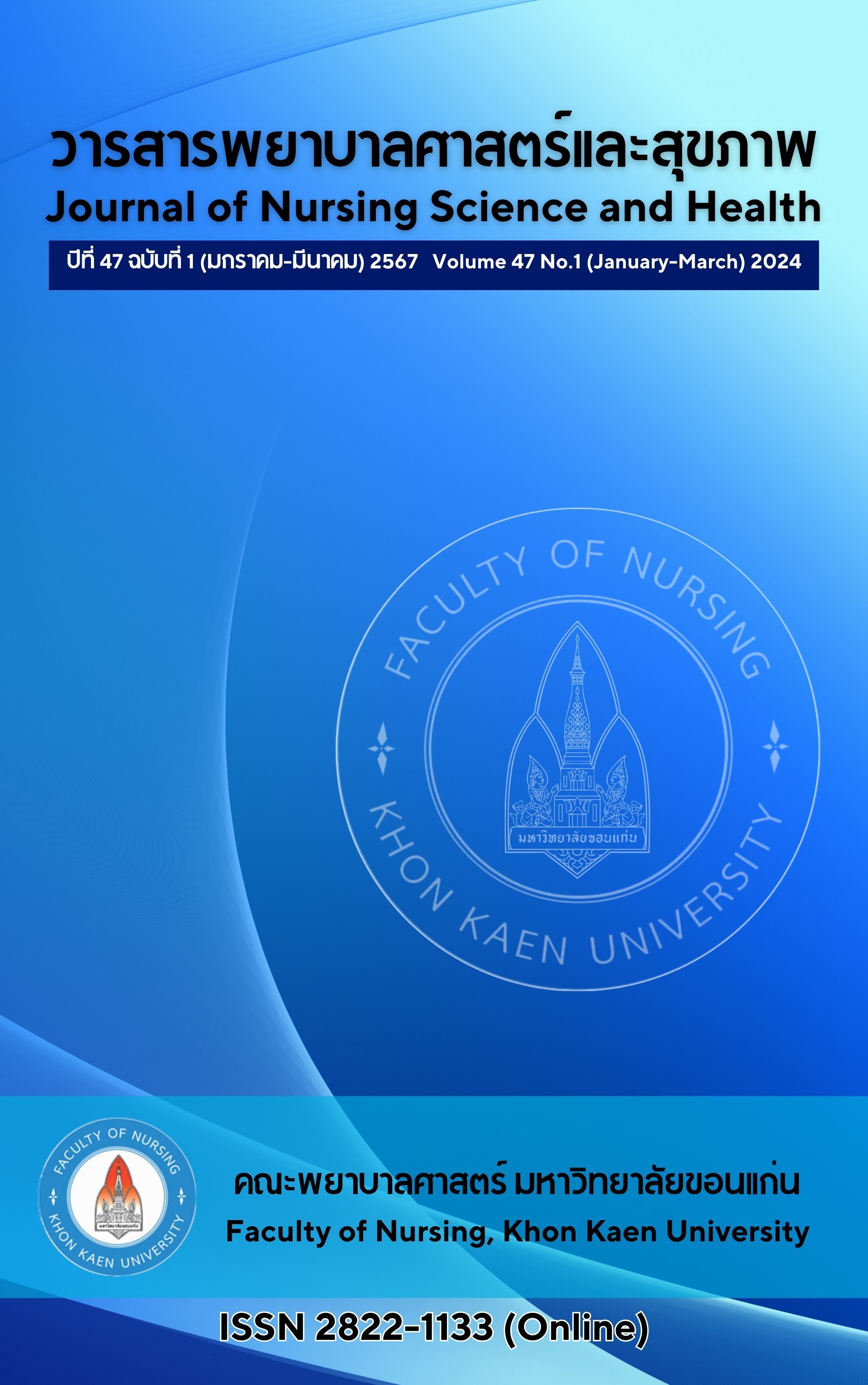ผลของโปรแกรมการลดความโดดเดี่ยวผ่านแพลตฟอร์มสุขภาพดิจิทัล ต่อความโดดเดี่ยวในผู้ป่วยวัยรุ่นโรคมะเร็ง
คำสำคัญ:
โปรแกรมการลดความโดดเดี่ยว , ผู้ป่วยวัยรุ่นโรคมะเร็ง , แพลตฟอร์มสุขภาพดิจิทัลบทคัดย่อ
การศึกษานี้มีวัตถุประสงค์ เพื่อศึกษาผลของโปรแกรมการลดความโดดเดี่ยวผ่านแพลตฟอร์มสุขภาพ ดิจิทัลต่อความโดดเดี่ยวของผู้ป่วยวัยรุ่นโรคมะเร็ง กลุ่มตัวอย่าง คือ ผู้ป่วยวัยรุ่นโรคมะเร็งที่เข้ารับการรักษา ที่ห้องตรวจกุมารเวชกรรม โรงพยาบาลมหาวิทยาลัยแห่งหนึ่งในภาคตะวันออกเฉียงเหนือในช่วงเดือนเมษายน ถึงมิถุนายน พ.ศ. 2566 คัดเลือกโดยใช้วิธีแบบเฉพาะเจาะจงตามเกณฑ์คัดเข้า จำนวน 32 คน เครื่องมือวิจัย ประกอบด้วย 1) แชท บอทเป็นแอปพลิเคชันสนทนาอัตโนมัติ ชื่อว่า“Feel My Feeling” 2) เว็บไซต์ https://www.lonelinessthesis.com/ เกี่ยวกับบทเรียนและกิจกรรมโปรแกรมการลดความโดดเดี่ยว 3) แบบประเมินความโดดเดี่ยวสำหรับผู้ป่วยวัยรุ่นโรคมะเร็ง วิเคราะห์ข้อมูลโดยใช้สถิติเชิงพรรณนาและสถิติ paired t-test
ผลการศึกษาพบว่า ผู้ป่วยวัยรุ่นโรคมะเร็งมีค่าคะแนนเฉลี่ยความโดดเดี่ยวก่อนและหลังได้รับโปรแกรมแตกต่างกันอย่างมีนัยสำคัญทางสถิติที่ ระดับ .05 โปรแกรมการลดความโดดเดี่ยวสามารถนำไปใช้ในการให้กิจกรรมการพยาบาล เพื่อลดความโดดเดี่ยวในผู้ป่วยวัยรุ่นโรคมะเร็งตามพัฒนาการตามวัยของ ผู้ป่วย รวมถึงเป็นแนวทางในการพัฒนาแพลตฟอร์มสุขภาพดิจิทัล เพื่อให้ความรู้กับกลุ่มผู้ป่วยวัยรุ่นโรคอื่น ๆ
เอกสารอ้างอิง
World Health Organization. Cure all framework: WHO global initiative for childhood cancer: Increasing access, advancing quality saving lives [Internet]. Geneva: WHO; 2019 [cited 2022 Aug 25]. Available from: https://apps.who.int/iris/handle/10665/347370
Anurathapan U. Children's cancer is dangerous but it can be cured if you recognize it early and treat it early [Internet]. Bangkok: Rama channel; 2020 [cited 2022 Sep 21]. Available from: https://kku.world/h7615 (in Thai)
Niyomkar S. Basic knowledge and nursing care for pediatric with cancer. Chiang Mai: Chiang Mai University; 2021. (in Thai)
Vasudevan V, Cheung MC, Yang R, Zhuge Y, Fischer AC, Koniaris LG, et al. Pediatric solid tumors and second malignancies: Characteristics and survival outcomes. J Surg Res 2010; 160:184-9.
American Cancer Society. The American cancer society medical and editorial content team. Treating children with cancer childhood cancer treatment [Internet]. Atlanta (GA): The Society; 2019 [cited 2022 Aug 21]. Available from: https://www.cancer.org/cancer/ cancer-inchildren/how-are-childhood-cancers-treated.html
Attharos T, Chaiyaratana C. Experiences of school-age children with cancer receiving chemotherapy. Journal of Nursing Science & Health 2017;40(4):12-8. (in Thai)
Samphan R, Treenai S. Experiences of returning to school during chemotherapy of adolescents with cancer. Nursing Journal CMU 2022;40(4):330-4. (in Thai)
Winterling J, Jervaeus A, Af Sandeberg M, Johansson E, Wettergren L. Perceptions of school among childhood cancer survivors: A comparison with peers. J Pediatr Oncol Nurs 2015;32(4): 201-8.
Chien CH, Chang YY, Huang XY. The lived experiences of adolescents with cancer: A phenomenological study. Clin Nurs Res 2020;29(4):217–25.
Deckx L, Van den akker M, Buntinx F. Risk factors for loneliness in patients with cancer: A systematic literature review and meta-analysis. Eur J Oncol Nurs 2014;18(5):466-77.
Kendra C. Identity vs. Role confusion in psychosocial development [Internet]. New York: Verywell; 2022 [cited 2023 Nov 17]. Available from: https://www.verywellmind.com /identity-versus-confusion-2795735
Perlman D, Peplau LA. Loneliness. Encyclopedia of mental health 1998;2:571-81.
Department of Mental Health. Decode loneliness! When Thai society is full of people feeling lonely [Internet]. Nonthaburi: Department of Mental Health; 2020 [cited 2022 Sep 21]. Available from: https://dmh.go.th/news-dmh/view.asp?id=29723 (in Thai)
Masi CM, Chen HY, Hawkley LC, Cacioppo JT. A meta-analysis of interventions to reduce loneliness. Pers Soc Psychol Rev 2011;15(3):219-66.
Canter KS, Christofferson J, Scialla MA, Kazak AE. Technology-focused family interventions in pediatric chronic illness: A systematic review. J Clin Psychol Med Settings 2019;26(1):68-87.
Battles HB, Wiener LS. Starbright world: Effects of an electronic network on the social environment of children with life-threatening illnesses. Children's Health Care 202;31(1):47-68.
Hickin N, Kall A, Shafran R, Sutcliffe S, Manzotti G, Langan D. The effectiveness of psychological interventions for loneliness: A systematic review and meta-analysis. Clin Psychol Rev 2021;88:102066.
Chirawatkul A. Statistics for health science. 4th ed. Bangkok: Wittayaphat; 2016. (in Thai)
Lim MH, Rodebaugh TL, Eres R, Long KM, Penn DL, Gleeson JFM. A pilot digital intervention targeting loneliness in youth mental health. Front Psychiatry 2019;10:604.
Ongiem A, Vichitvejpaisa p. Validation of the tests. Thai J Anesthesiol 2018;44(1):36-42. (in Thai)
Johnson RB, Christensen L. Educational research: Quantitative, qualitative, and mixed approaches. 7th ed. California: SAGE Publications; 2020.
ดาวน์โหลด
เผยแพร่แล้ว
รูปแบบการอ้างอิง
ฉบับ
ประเภทบทความ
สัญญาอนุญาต
ลิขสิทธิ์ (c) 2024 วารสารพยาบาลศาสตร์และสุขภาพ

อนุญาตภายใต้เงื่อนไข Creative Commons Attribution-NonCommercial-NoDerivatives 4.0 International License.
วารสารพยาบาลศาสตร์และสุขภาพเป็นเจ้าของลิขสิทธิ์ในการเผยแพร่ผลงานที่ตีพิมพ์ห้ามผู้ใดนำบทความที่ได้รับการตีพิมพ์ในวารสารพยาบาลศาสตร์และสุขภาพไปเผยแพร่ในลักษณะต่าง ๆ ดังนี้ การนำบทความไปเผยแพร่ออนไลน์ การถ่ายเอกสารบทความเพื่อกิจกรรมที่ไม่ใช่การเรียนการสอน การส่งบทความไปตีพิมพ์เผยแพร่ที่อื่น ยกเว้นเสียแต่ได้รับอนุญาตจากวารสารพยาบาลศาสตร์และสุขภาพ



